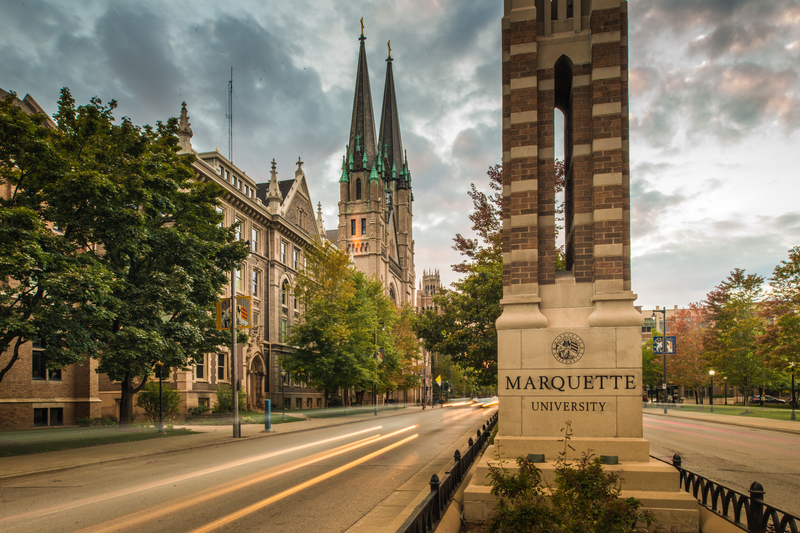This afternoon nearly 700 students, faculty and staff gathered virtually for a Campus Town Hall.
Moderated by Dr. Xavier Cole, vice president for student affairs, the event provided an update on university finances, academic planning, COVID-19 on campus and plans for the spring semester.
The event was recorded; the video is available on the new Economic Planning website: marquette.edu/economic-planning (note that you will need a Marquette login to view the video).
Rev. Jim Voiss, S.J., vice president for mission and ministry, began the town hall with an invocation in which he prayed for the resilience of our community during this time of uncertainty and change.
President Michael R. Lovell shared opening remarks in which he acknowledged the difficult realities facing Marquette and higher education nationally and reinforced the university’s commitment to our mission during this time.
President Lovell shared that the most common question he gets asked is about his vision for Marquette in the next few years and what the university will look like after we emerge from the pandemic. He explained that this truly relies on feedback from the campus community, “We need your input and help in defining Marquette’s future,” he said. He added that the fundamental question we all need to answer is “How do we best uphold our Catholic, Jesuit identity and values in the face of our present challenges?”
“When I reflect on my personal vision for the future, there are two pillars that differentiate Marquette that cannot change as we restructure,” President Lovell said. “The first pillar,” as he explained, “is our commitment to academic excellence, being innovative and serving our students. The second pillar is a commitment to our Catholic, Jesuit identity—our mission is to train men and women to live their lives in service to and with others and to be agents of change in the world.”
Next, Provost Kimo Ah Yun discussed the academic vision for Marquette, also focusing on the university’s commitment to its mission and values during this time. “The key to a strong Marquette going forward will be strong academic affairs,” Provost Ah Yun said.
He then gave an overview of the university’s budget shortfall and the collaborative process that followed by working with University Academic Senate and Faculty Council to get faculty input on structural changes that will ultimately affect teaching, research and other programs at Marquette.
Provost Ah Yun gave a progress update on academic planning / academic workstreams based on recent workgroup listening sessions and shared a timeline for next steps.
Last, he shared an update on the tenure buyout program for full-time tenured faculty, which closed on Monday and resulted in 31 faculty members stepping up.
Senior Vice President and Chief Operating Officer Joel Pogodzinski then talked about the university’s financial state, including what measures are being taken to mitigate a shortfall for 2022. He shared that the university is increasing targets to reduce discretionary spending (i.e. cost-savings as a result of limited travel and fewer in-person events).
SVP and COO Pogodzinski then gave a brief overview of the university’s budget and explained the Board of Trustees’ role in the approval process. They will approve a new budget for the next fiscal year in early December.
Next, he provided an update on the Voluntary Incentivized Retirement Program for staff. There were 155 eligible staff. The program closed yesterday, and applications are currently under review.
SVP and COO Pogodzinski concluded his segment with an update on non-academic workstreams.
After the executive leadership team presented, Dr. Jeanne Hossenlopp, vice president for research and innovation, gave an update on the revenue generation workstream. The team, which is focused on creative strategic growth opportunities to support Marquette’s future, is building on prior campus input from groups including the Beyond Boundaries Steering Committee and Ideation Review Council. The workstream also includes a number of ideas and input submitted from the campus community, including exploring opportunities in interdisciplinary data science and strategic online program growth through partnerships with online program managers.
Dr. Xavier Cole took a moment to extend his gratitude to the entire Marquette community for their efforts in making an in-person experience possible this semester—specifically the dedicated staff in the Medical Clinic—and the many faculty, staff and students across campus who have taken seriously their responsibility to follow COVID-19 protocols and who have been adaptable during changing circumstances.
Dr. John Su, vice provost for academic affairs, then highlighted some end-of-semester accomplishments and commented on Marquette’s remote, hybrid and in-person learning offerings. He also shared an update on academic processes / procedures for spring 2021.
Lastly, Keli Wollmer, MPAS, P.A.-C, executive director of the Marquette University Medical Clinic, gave an update on the COVID-19 dashboard / recent increase of cases on campus. She also talked about coronavirus planning underway for the spring semester.
The event concluded with a Q&A in which presenters answered a variety of questions submitted in advance as well as during the event.
In closing, Dr. Xavier Cole read “A Prayer for a Pandemic” from the university’s Faith site.
The Marquette community is encouraged to visit the university’s dedicated Economic Planning and Coronavirus websites for frequent updates and FAQs. Responses to questions that were asked during the town hall will be shared on the sites’ respective FAQ pages.
- With additional economic planning related questions, complete the online form on the Economic Planning website.
- With additional COVID-19 related questions, complete the online form on the COVID websiteor contact the appropriate COVID-19 Response Team lead, listed on the university’s coronavirus website.



